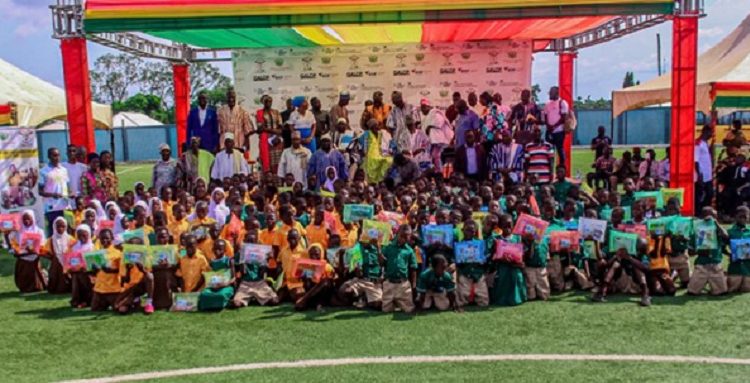Stakeholders with learners during the durbar in Walewale
About 200 learners in the Walewale Municipal of the North East Region, have been transitioned into mainstream schools through the Ghana Education Outcomes Project (GEOP) under the Ghana Accountability for Learning Outcomes Project (GALOP).
The project is designed to train, re-integrate and improved learning gains in schools.
Director Pre-Tertiary, Ministry of Education, Nana Barfour-Awuah, during a Durbar in Walewale said over the past two years, GEOP has made significant strides in taking approximately 35,543 children between the ages of 8-16 years through a nine month Accelerated Learning Programme (ALP), thereby equipping them with basic literacy and numeracy skills.
According to him, over 21,103 learners have been transitioned into mainstream schools after the successful completion of the second cohort of the ALP.
“As we celebrate this milestone, it is worth noting that the Ministry of Education, through its service providers and all other stakeholders, made progress in increasing the number of learners in cohort two by 3,673 learners, which is a considerable achievement,” he said.
He noted that, education is the cornerstone of development, and as such, every child deserves access to quality learning, adding that the Ministry is implementing the transformative outcomes-based design – GEOP, designed to give school drop-outs and street children a second chance.
Plan International Northern Programme Manager, Sulemana Gbana Hor, indicated that through the Mainstream School Improvement Programme (MSIP), Plan International has equipped teachers with the tools they need to improve teaching quality and learning outcomes in 239 MSIP schools throughout three regions and 11 districts.
“We have provided targeted training to teachers, empowering them to deliver remedial lessons to underperforming students, facilitating their academic progress. These teachers are also championing the creation of Professional Learning Communities (PLCs) within their schools, promoting collaboration and knowledge-sharing. Additionally, headteachers and district education officials have been actively involved in coaching and mentoring teachers, ensuring a continuous improvement of teaching standards across the board,” he said.
Mr. Hor stated that on the ALP, Plan International has successfully completed two cycles of the CBE programme, supporting the learning of 13,458 out of school children and that learners, after completing their CBE cycle, are being supported to return and stay in formal schooling.
“Our efforts to ensure their continued success include the provision of supportive attendance tracking systems and bursary provisions, which encourage consistent school attendance and reduce the financial burden on families,” he added.
He urged all stakeholders to recognise the importance of continuing this vital work.
“Investing in education is not about academic success but also about creating future leaders who will contribute to the growth and development of our communities and nation,” he said.
FROM Eric Kombat, Walewale


